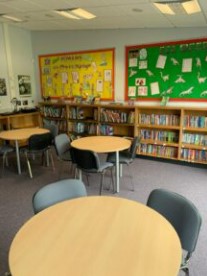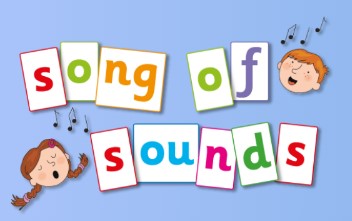Reading
Click the button below to view a summary of our approach to reading at Dallimore.
Early Years Foundation Stage and Years 1 and 2
In EYFS and KS1, daily phonics lessons take place to support the development of children’s decoding skills. The Song of Sounds scheme is used to provide an enjoyable and well-structured phonics scheme. We believe that regular, high-quality phonics sessions are fundamental to successful reading. Any children who fall behind with their phonics are quickly identified and interventions are put in place to support their progress. This may focus on identifying the sounds made by certain graphemes or on blending sounds. Phonics Tracker is used to keep an accurate and up-to-date record of what children need to develop.
Have a look at Song of Sound by clicking the logo below
Phonics Play can be used at home to help children practise their reading skills
KS1 fluency
In addition to daily phonics lessons, children in KS1 also participate in three fluency lessons each week. These are whole class sessions which focus on speed, accuracy and prosody. A ‘my turn, your turn’ approach allows the teacher to model reading with good fluency and the children aim to replicate this. A number of questions are asked throughout to check for understanding of the text that has been read. A range of texts including poetry, non-fiction and fiction are used to develop children's reading fluency. Non-fiction texts have been carefully chosen to compliment the wider curriculum and give children extended/hinterland knowledge in certain areas.
Fluency overview KS1
Click on the button below to view the long-term overview of texts used to develop reading fluency.
Years 3 to 6
In KS2, children access two fluency sessions each week. Children are taught using a ‘my turn, your turn’, repeated oral reading approach and focus on the three key aspects of fluency: speed, accuracy and prosody (rhythm and expression). We recognise that fluency is the bridge between decoding and comprehension and therefore place a high emphasis on ensuring that children can read fluently.
Fluency lessons focus on non-fiction texts and poetry texts. The non-fiction texts provide the children with an opportunity to revisit learning from the wider curriculum or to learn about wider curriculum content that they will learn at a future point in school. Poetry is recognised as an effective genre to support the development of prosodic rhythm. We also provide opportunities for children to chorally read parts of the whole class novel and teachers re-model sentences and sections to further develop fluency.
Click on the button below to view our rationale behind fluency sessions and the fluency lesson structure for KS2.
Fluency overview KS2
Click on the button below to view the long-term overview of texts used to develop reading fluency.
A further 2 lessons of reading are taught in KS2 and based on the whole class novel. These sessions include a retrieval practice quiz to ensure that all children have understood key aspects of the text, a vocabulary check which identifies difficult vocabulary prior to reading, and a range of VIPERS questions to check for understanding of what has been read. Teachers also model the skills of good readers when reading aloud to the class.
All staff model and teach the skills that good readers use to understand what they are reading. Texts are chosen carefully to support learning and can link to the curriculum or are chosen to support another aspect of learning.
KS2 reading journey
Click on the image below to see the KS2 reading journey and the books that children will read as part of our reading curriculum.
Specialist reading teacher
We have a teacher dedicated to the teaching of reading in school. Mrs Greaves supports staff in assessing, tracking and delivering highly effective phonics lessons, in addition to providing additional individual support to any children who might require it through targeted phonics interventions or through the ten-minute read intervention.
Reading interventions
There are several interventions that we use to support any children who may struggle with their reading. These depend on the aspect of reading that a child may be finding difficult. If this is decoding words, an appropriate phonics intervention will take place. If fluency is an issue, a teaching assistant will spend time modelling fluent reading of a short passage of a text or poem, followed by the child re-reading the text up to three times. The aim of this is to improve the fluency of the read each time with the teaching assistant remodelling where necessary. If a child is finding it difficult to make meaning from a text, despite good decoding and fluent reading, they will take part in the ‘Boosting reading at primary’ intervention. This intensive, one-to-one intervention aims to boost comprehension over the course of ten weeks. Teaching Assistants also receive training in the ten-minute read intervention which targets a variety of different reading needs.
Book Club
We have recently launched Book Club in school. Book Club is a twenty-minute slot in each class. During this time, the class teacher shares recommended books that children might wish to read for pleasure. The teacher will read the blurb, share the first chapter and engage in lots of discussion about the book. Other children will have the opportunity to recommended books too. We select our books using recommended reads for each year group.
Click on the link below to find books that your child might enjoy reading for pleasure.
Recommended books for each year group
Our library
We are lucky to have a lovely school library. Library sessions are timetabled throughout the week so that classes can have time to choose additional books to read at home. Children can choose from a wide variety of fiction and non-fiction books and these compliment the school reading scheme and the class libraries. We are lucky to have 2 teaching assistants that currently run a library club at lunchtime every Thursday for any children in KS2 who would like to attend.




